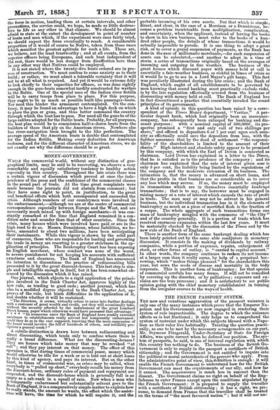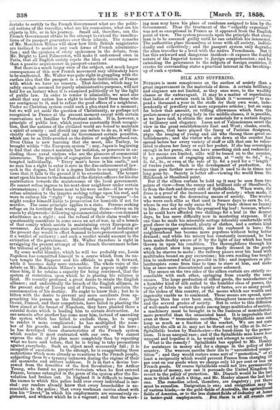THE FRENCH PASSPORT SYSTEM.
The new and vexatious aggravation of the passport nuisance is only one of the many instances which prove that the Emperor Na- poleon and his Government are now engaged in rendering their system of rule impracticable. The degree to which the nuisance affects us is but fractional ; it only helps us to comprehend the system of restraint under which the subjects blessed with a Napo- leon as their ruler live habitually. Treating the question practi- cally, as one to be met by the necessary arrangements on our part, Mr. Seymour Fitzgerald, Under-Secretary of State for Foreign Affairs, was quite correct when he defined our position. The sys- tem of passports, he said, is one of internal regulation with which this country has nothing to do. The business of the British.Gc-
vernment is only to supply in the passport a certificate. of h citizenship ; and the Government is not entitlaa to inquire into the political or moral antecedents of the peroons who apply. From the administrative point of view, this definition is enough : will enable the French Government to understand how far the British Government can meet the requirements of our ally, and how far it cannot. The acquiescence is much lass in amount than the dissent. The Government claims no right on behalf of the Eng- lishman to enter France except upon the conditions stipulated by the French Government: it is prepared to supply the traveller with a certificate of British citizenship ; it has a right, we pre- sume, to demand from France that the traveller shall be treated on the terms of" the most favoured nation " ; but it will not un- dertake to oertify to the French Government what are the politi- cal notions of the traveller, what are his connexions, what are his objects in life, or in his journey. Small aid, therefore, can the French Government obtain in the attempt to extend the ramifica- tions of its passport guarantees over these islands.. The remarks of Mr. Moncktonlnes will show how little British magistrates are inclined to assist in any such forms of French administra- tion; and the opinions of every spokesman in the debate, from Mr. Bright to Lord Palmerston, will make it understood even in Paris, that all English society repels the idea. of according more than a passive acquiescence in passport-exactions. But there is a much larger view of the subject, and much larger consequences of this new French movement may ultimately have to be confronted. Mr. Walter was quite right in grappling with the surface idea that the passport is a domestic institution of France with which we have no concern. That doctrine, which may be safely enough assumed for purely administrative purposes, will not hold for an instant when it is examined politically or by the light of public law. In order to render it admissible, we must also admit that any nation has a right to isolate itself from those who are contiguous to it, and to refuse the good offices of a neighbour. Under no Christian system could such a plea stand for a moment; but we will set aside the question of Christianity, as perhaps not recognized in France at the present moment except with certain reservations not familiar to Protestant minds. It is, however, .a principle of public law, which receives constantly fresh recogni- tion, that the nations of the civilized world are bound to maintain a apirit of comity ; and should -any one refuse to dose, it will in- stantly draw upon itself and its Government certain penalties, whioh can be as little avoided as the duties of neighbourhood can. Even China is now learning that she must, like Turkey,be brought within "the European system " ; nay, Japan is beginning to find that she cannot maintain her isolation, or persevere in ex- cluding those naval visitors who are the pioneers of commercial intercourse. The principle of segregation has sometimes been at- tempted individually. "Every man's house is his castle," and no man has a right to enter it save in the due enforcement of law: such is the dogma, but it is a dogma liable to so many qualifica- tions that it falls to the ground if it be overstrained. The tenant must open his house to the demands of the district-officers for his due contribution towards the maintenance of the local government. He cannot refuse ingress to his next-door neighbour under certain circumstances : if the house next to his were on fire—if he were to refuse admission to the inmates seeking refuge upon his roof, and were to enforce his "right" by repelling their "trespass "—he might render himself liable to prosecution for homicide if not for murder. The same principle applies to a state. Persons seeking refuge on its territory from wrong pursuing them—driven on its coasts by shipwreck—following up commercial claims—can demand admittance as a right; and the refusal of their claim would un- questionably constitute in some eases an act of war, in all a breach of that comity which assists in maintaining every European go- vernment. An European state pretending the right of isolation at the present day would in effect demand to have pronounced against it a verdict of outlawry ; and such a verdict would amount to the extinction of the government. Mr. Walter therefore is right in arraigning the present attempt of the French Government before the tribunal of public law. By some Ireful blunder, which he will too probably rue, Louis Napoleon has committed himself to a course which from its na- ture tempts the Emperor and his officials to push it forward, while it becomes daily more untenable. The whole voice of the debate on Mr. Monckton. Milnes's motion for papers might con- vince him, if he retains a capacity for being convinced, that the system of restriction upon which he is placing his reliance is fatal. He recently professed a great desire to retain the English alliance; and undoubtedly the breach of the English alliance, in the present state of Europe and of France, would proclaim the consummation of his destiny. He ought to know that ; but he is bitten with the desire to prevent any more assailants from ap- proaching his person as the Italian refugees have done. If Orsini, Pianori, and their compatriots, have failed in planting the blow aimed at the breast of Napoleon, they have planted there a suicidal desire which is leading him to certain destruction. As one assassin after another has come near him, instead of amending the system which has failed to exclude them, he is urged to render it more complicated; he has multiplied the num- ber of his guards, and increased the severity of his laws ; he .has developed those characteristics of the French system which render it most contrasted with our own. We cannot express the aim of his plan more completely than by repeating what we have said before, that he is trying to take precautions against everybody. Such an object must necessarily fail ; it is uicapable of execution. In the attempt, he is exaggerating those restrictions Which were already so vexatious to the French people, subjecting them to a tyranny unknown during the re,gime of their old monarchs and anciont noblesse. It is in fact a device bor- rowed from the ferocities of the first Revolution; for Arthur Young, who found no passport-restraints when he first entered France, became entangled in the germ of the system after the Re- volution had broken out. In England it is difficult to imagine the excess to which this police hold over every individual is car- ried: our readers already know that every householder is ac- countable to the police; that every workman carries about with bun his " livret," in which his employments are successively re- gistered, and without which he is a vagrant; and that the work- ing man may have his place of residence assigned to him by the Government. Thus the treatment of the "culpably expectant" was not so exceptional in France as it appeared from the English point of view. The system proceeds upon the principle that every man is to be assumed guilty until he can establish his innocent*, The authorities place themselves at issue with all society, indivi- dually and collectively ; and the passport system only degrades the alien traveller to a level with the native Frenchman. But it has this awkward and dangerous incident—it exposes the fearful nature of the Imperial tenure to foreign comprehension; and by extending the grievances to the subjects of foreign countries it creates for surrounding states a practical interest in the breaking_ up of such a system.



























 Previous page
Previous page